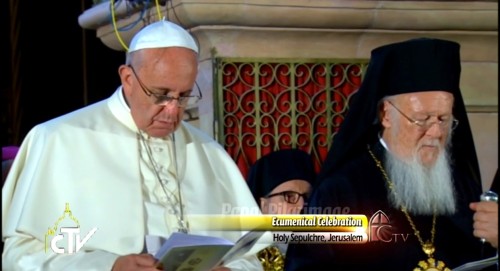by Gh. Zervos
Ecumenist prayer inside the Holy Sepulchre performed by heretic pope and ecumenical Patriarch.
The heretic pope and ecumenical Patriarch prayed together “Our father” (in Italian language) and different pericopes from the gospel while through the joint Declaration they both signed, the ecumenical Patriarch: a) proclaims that the Orthodox Church does not hold the entire truth of faith, but only parts of it, b) brings back the blasphemous theory of Athenagoras about the restoration of the One, Holy, Catholic and Apostolic Church (so he tells us that this is not the one we believe in and follow) sowing seeds of discord among the believers and abolishing the dogmas of Chuch, c) acknowledges the chief of Vatican state as a canonical bishop and his “church” as being canonic and d) adopts all Athenagoras’ principles and accepts the diplomacy of a soppy love from Vatican for an evolution towards pseudo-unity.
Theophilos, the Patriarch of Jerusalem calls the heretic pope Aghiotaton [1] (although the pope has never left the infallibility that makes him alike God, because only He is infallible), he acknowledges him not as a head of state and heresiarch but as the first canonic head of Church. All the things preached by the anti-papist and anti-heresy Saints of our Church are useless for the Patriarch of Jerusalem, Theophilos, adept for inter-religious dialogues and not only. The Archbishop of America, Dimitrios proves to be, according to his declarations, an adept for the laic ecumenism and talks about division of Church and not about Schism and heresy.
While Greece was voting for the euro Parliament candidates, mayors and D.A. and the citizens were focused on the political and national messages of the electorate, the ecumenical Patriarch Bartholomew, together with his “custody” met the heresiarch pope at Holy Sepulchre exchanging greetings and kisses of peace.
With the occasion of this meeting from Jerusalem declarations and proclamations resulted into compromising the Orthodoxy and Patristic Theology. This compromise was made by the ecumenical patriarch Bartholomew, the Patriarch of Jerusalem and the one of America who accompanied the ecumenical Patriarch to Jerusalem.
Theophilos, the patriarch of Jerusalem opposite to blessed patriarch Benedict who was against the meeting of Pope Paul IV with patriarch Athenagoras (fifty years ago), approved the joint pray of the pope together with the ecumenical Patriarch, although the first aforementioned one is still nailed by the heresies and wanderings of popery. He called in the same time the pope as Aghiotaton, although he continues to be committed to the heresies of popery: Filioque, primacy, infallibility, his audacious opinion that according to him is the exclusive representative of Christ on earth. Through this position, Theophilos the patriarch of Jerusalem proved that the crisis created between him and his antecedent, was directed towards the election of a new patriarch, the present one, who is an excessive adept of inter-religious meetings and dialogues with heterodox whom he considers to be part of the saving and canonic “Church”. The Holy Canons that forbid the prayers together with heretics are not valid for the patriarch of Jerusalem.
The Archbishop of America
The Archbishop of America, Dimitrios, to the big surprise of the orthodox clergy and laymen, is the adept of the laic ecumenism (the excellent cooperation with the subjects that the nowadays society confronts with) and he hinted that the meeting of Pope Paul IV with patriarch Athenagoras 30 years ago resulted into the elimination of discord. The archbishop talks about discord and not about schism and heresy. The declarations on this line were made before the meeting of pope with the ecumenical patriarch and after the meeting of His eminence with the head of Vatican for the unification of all “churches”. The declaration is the following:
“The historic meeting between Pope Paul VI and Ecumenical Patriarch Athenagoras in Jerusalem in January 1964 was a joyful occasion that swept aside centuries of division and has born good fruit, said Archbishop Joseph E. Kurtz of Louisville, Kentucky, president of the U.S. Conference of Catholic Bishops and Archbishop Dimitrios primate of the Greek Orthodox Church in America and chairman of the Assembly of Canonical Orthodox Bishops of the United States of America, in a joint statement.
The declaration refers to the meeting from the 25th of May between Pope Francisc and ecumenical Patriarch Bartholomew from Jerusalem.
Catholic and Orthodox Christians over the last 50 years has allowed them “to speak with one voice” on issues facing society. “We commit ourselves to increased cooperation in these areas, including social, economic, and ethical dilemmas, and we call our people to pray for the success of the upcoming meeting between Pope Francis and Ecumenical Patriarch Bartholomew in Jerusalem for the glory of God and the promotion of Christianity in our wounded world,” the statement said.
The Archbishop Kurtz himself solitarily spoke about the meeting that he characterized as a “considerable gift” referring to “reciprocal respect and tolerance”.
The ecumenical patriarch
The ecumenical patriarch Bartholomew, during his meeting, solemnly proclaimed the joint statement made by Jesuit pope Francisc, that he is loyal to the principles and positions of the ecumenist ecumenical Patriarch Athenagoras who flew out into the Orthodox Church the discord against the Holy and inspired by God Canons and dogma of Orthodox Church. He recognized the pope as bishop, the Vatican as sister “church”, he prayed in the Holy Sepulchre together with the heresiarch, he jointly advised that the steps towards the union are guided by the Holy Spirit, when he denies the work of Holy Spirit in the anti-papist Saint of our Church and proclaims in the joint statement that he signed together with the pope that he stays loyal to Athenagora’s principles in order to create a new Church. In order for a believer to understand the spirit of the joint Declaration of the present ecumenical Patriarch and present pope it is sufficient to read the following fragment of the interview that Patriarch Athenagoras gave during the period he was shepherd: “We are deceived and we sin, if we think that the Orthodox faith came down from Heaven and that all [other] creeds are unworthy. Three hundred million people have chosen Islam in order to reach their god, and other hundreds of millions are Protestants, Catholics, and Buddhists. The goal of every religion is to improve mankind”. “In the movement for union, it is not a question of one Church moving towards the other, but let us all together found back the One, Holy, Catholic, and Apostolic Church, coexisting in the East and the West, as we lived up until 1054, in spite of the theological differences that existed then”. “The age of dogma has passed.” “We are being called upon to free ourselves from the nets of polemic and controversy in theology and to equip theology with the spirit of inquiry and the formulation of the truth in love and patience. Christianity, today, needs a theology of reconciliation.”
The Patriarch Athenagoras was against the dogma and the orthodox Theology that was a stumble rock towards the pseudo-union. His positions were adopted by his successor on the throne of Phanar, Patriarch Dimitrios as the present Patriarch Bartholomew. There is not any paragraph in the joint declaration of the present patriarch and heresiarch pope that referred to the dogmas.
The soppy love and Declaration
Instead of referring to the dogmas the soppy love takes over. If you take a closer look at the Declaration you will realize that all the things settled by Patriarch Athenagoras are in the content of the joint Declaration from Jerusalem.
Here is how it sounds like:
“Pope Francis and the Ecumenical Patriarch, Bartholomew I, on Sunday held private talks in Jerusalem and signed a Common Declaration in which they pledged to continue on the path towards unity between the Catholic and Orthodox Churches. Their encounter marked the 50th anniversary of the historic meeting between Pope Paul VI and the Patriarch Athenagoras in 1964. In their joint declaration, Pope Francis and Patriarch Bartholomew said it is their duty to work together to protect human dignity and the family and build a just and humane society in which nobody feels excluded. They also stressed the need to safeguard God’s creation and the right of religious freedom. The two leaders expressed concern over the situation facing Christians amidst the conflicts of the Middle East and spoke of the urgency of the hour that compels them to seek the reconciliation and unity of the human family whilst fully respecting legitimate differences.
Please find below the full text in English of the Common Declaration of Pope Francis and the Ecumenical Patriarch Bartholomew I:
- Like our venerable predecessors Pope Paul VI and Ecumenical Patriarch Athenagoras who met here in Jerusalem fifty years ago, we too, Pope Francis and Ecumenical Patriarch Bartholomew, were determined to meet in the Holy Land “where our common Redeemer, Christ our Lord, lived, taught, died, rose again, and ascended into Heaven, whence he sent the Holy Spirit on the infant Church” (Common communiqué of Pope Paul VI and Patriarch Athenagoras, published after their meeting of 6 January 1964). Our meeting, another encounter of the Bishops of the Churches of Rome and Constantinople founded respectively by the two Brothers the Apostles Peter and Andrew, is a source of profound spiritual joy for us. It presents a providential occasion to reflect on the depth and the authenticity of our existing bonds, themselves the fruit of a grace-filled journey on which the Lord has guided us since that blessed day of fifty years ago.
- Our fraternal encounter today is a new and necessary step on the journey towards the unity to which only the Holy Spirit can lead us, that of communion in legitimate diversity. We call to mind with profound gratitude the steps that the Lord has already enabled us to undertake. The embrace exchanged between Pope Paul VI and Patriarch Athenagoras here in Jerusalem, after many centuries of silence, paved the way for a momentous gesture, the removal from the memory and from the midst of the Church of the acts of mutual excommunication in 1054. This was followed by an exchange of visits between the respective Sees of Rome and Constantinople, by regular correspondence and, later, by the decision announced by Pope John Paul II and Patriarch Dimitrios, of blessed memory both, to initiate a theological dialogue of truth between Catholics and Orthodox. Over these years, God, the source of all peace and love, has taught us to regard one another as members of the same Christian family, under one Lord and Saviour, Jesus Christ, and to love one another, so that we may confess our faith in the same Gospel of Christ, as received by the Apostles and expressed and transmitted to us by the Ecumenical Councils and the Church Fathers. While fully aware of not having reached the goal of full communion, today we confirm our commitment to continue walking together towards the unity for which Christ our Lord prayed to the Father so “that all may be one” (Jn 17:21).
- Well aware that unity is manifested in love of God and love of neighbor, we look forward in eager anticipation to the day in which we will finally partake together in the Eucharistic banquet. As Christians, we are called to prepare to receive this gift of Eucharistic communion, according to the teaching of Saint Irenaeus of Lyon (Against Heresies, IV,18,5, PG 7,1028), through the confession of the one faith, persevering prayer, inner conversion, renewal of life and fraternal dialogue. By achieving this hoped for goal, we will manifest to the world the love of God by which we are recognized as true disciples of Jesus Christ (cf. Jn 13:35).
- To this end, the theological dialogue undertaken by the Joint International Commission offers a fundamental contribution to the search for full communion among Catholics and Orthodox. Throughout the subsequent times of Popes John Paul II and Benedict the XVI, and Patriarch Dimitrios, the progress of our theological encounters has been substantial. Today we express heartfelt appreciation for the achievements to date, as well as for the current endeavors. This is no mere theoretical exercise, but an exercise in truth and love that demands an even deeper knowledge of each other’s traditions in order to understand them and to learn from them. Thus we affirm once again that the theological dialogue does not seek a theological lowest common denominator on which to reach a compromise, but is rather about deepening one’s grasp of the whole truth that Christ has given to his Church, a truth that we never cease to understand better as we follow the Holy Spirit’s promptings. Hence, we affirm together that our faithfulness to the Lord demands fraternal encounter and true dialogue. Such a common pursuit does not lead us away from the truth; rather, through an exchange of gifts, through the guidance of the Holy Spirit, it will lead us into all truth (cf. Jn 16:13).
- Yet even as we make this journey towards full communion we already have the duty to offer common witness to the love of God for all people by working together in the service of humanity, especially in defending the dignity of the human person at every stage of life and the sanctity of family based on marriage, in promoting peace and the common good, and in responding to the suffering that continues to afflict our world. We acknowledge that hunger, poverty, illiteracy, the inequitable distribution of resources must constantly be addressed. It is our duty to seek to build together a just and humane society in which no one feels excluded or emarginated.
- It is our profound conviction that the future of the human family depends also on how we safeguard – both prudently and compassionately, with justice and fairness – the gift of creation that our Creator has entrusted to us. Therefore, we acknowledge in repentance the wrongful mistreatment of our planet, which is tantamount to sin before the eyes of God. We reaffirm our responsibility and obligation to foster a sense of humility and moderation so that all may feel the need to respect creation and to safeguard it with care. Together, we pledge our commitment to raising awareness about the stewardship of creation; we appeal to all people of goodwill to consider ways of living less wastefully and more frugally, manifesting less greed and more generosity for the protection of God’s world and the benefit of His people.
- There is likewise an urgent need for effective and committed cooperation of Christians in order to safeguard everywhere the right to express publicly one’s faith and to be treated fairly when promoting that which Christianity continues to offer to contemporary society and culture. In this regard, we invite all Christians to promote an authentic dialogue with Judaism, Islam and other religious traditions. Indifference and mutual ignorance can only lead to mistrust and unfortunately even conflict.
- From this holy city of Jerusalem, we express our shared profound concern for the situation of Christians in the Middle East and for their right to remain full citizens of their homelands. In trust we turn to the almighty and merciful God in a prayer for peace in the Holy Land and in the Middle East in general. We especially pray for the Churches in Egypt, Syria, and Iraq, which have suffered most grievously due to recent events. We encourage all parties regardless of their religious convictions to continue to work for reconciliation and for the just recognition of peoples’ rights. We are persuaded that it is not arms, but dialogue, pardon and reconciliation that are the only possible means to achieve peace.
- In an historical context marked by violence, indifference and egoism, many men and women today feel that they have lost their bearings. It is precisely through our common witness to the good news of the Gospel that we may be able to help the people of our time to rediscover the way that leads to truth, justice and peace. United in our intentions, and recalling the example, fifty years ago here in Jerusalem, of Pope Paul VI and Patriarch Athenagoras, we call upon all Christians, together with believers of every religious tradition and all people of good will, to recognize the urgency of the hour that compels us to seek the reconciliation and unity of the human family, while fully respecting legitimate differences, for the good of all humanity and of future generations.
The contents of the joint pray
The joint pray of the ecumenical Patriarch together with the heresiarch was done according to the official release of Patriarchy of Jerusalem, in front of the Holy Sepulchre. In the statement, amongst others were mentioned the following:
“Coming from the two doors, the Pope and the ecumenical Patriarch, at the edge and in the midst of the Blessed Church of Rise, they kissed each other as a proof and evidence of love and disposition to continue the theological dialogue started 30 years ago.
From here, the two primates proceeded forth to the door of the Blessed Church of Rise where they were welcomed by three priors of the Holy Church of Rise, meaning by our archbishop of Ierapole, Isidor, by the Franciscan and Armenian ones.
Further, the two primates kissed the Stone of Anointing while the Greek choir of the Holy Church of Rise, conducted by the Proto Psaltic music performer Aristovul, sang: “I will enter…” and while the primates came from the Stone of Anointing and were proceeding to the Holy Sepulchre, they sang: “Your Sepulcher, O Savior…”
After reaching in front of the Sepulcher, the two primates, according to the scheduled program, sat themselves with their own companions, while the people, around 400 believers, entered and took their scheduled sits.
After they all sat, according to the schedule and silently followed, according to the program, the speech of the Patriarch of Jerusalem, Theophilos on behalf of Patriarchy of Jerusalem followed by the ones of Franciscans and Armenians.
It then continued with different chants and reading of some periscopes of the Rise from the Gospel, followed by the homilies of ecumenical Patriarch Bartholomew and Roman Pontiff, Francisc and finalized with the kiss of peace.
Further, the pray “Our Father” in Italian language was said by the Roman Pontiff and ecumenical Patriarch and by the invited ones each one in their own language and afterwards the two primates entered inside the Holy Sepulcher and worshiped it.
We mention that the hymns and periscopes from the Gospel were read without liturgical robes due to the absence of the complete communion between the Roman-Catholic Church and the Orthodox Church.
After ending this ceremony, the two primates, accompanied by their small suite went up and worshiped the appalling Golgotha.”
Tremendous
Thus, the ecumenical Patriarch, considered to be the accomplisher of the Holy Canons, prayed together with the head of Vatican state and leader of a Christian heretic “church” at the Holy Sepulchre. The ecumenical Patriarch sacrifices the truth of our Faith for the “interest” of the Christian heresy. If the Orthodox Christians prayed the way he did then either the Orthodoxy would stop existing or there would occur schisms in the name of Orthodoxy. These are not by chance situations that are tragically happening among the Orthodox world. The responsibility for these is carried not only by the indecency of the consumerist society but also by the lack of respect to the Holy Laws of the Orthodox Church from the side of patriarchs, archbishops, etc. In the official statement of the Patriarchy of Jerusalem, the heresiarch pope was called as head of the Roman-Catholic Church. The patriarchy of Jerusalem actually equalizes the head of the Orthodox Church (the One, Holy, Catholic and Apostolic Church), Christ with the “slipper” of the heresiarch and the divine wisdom of Christ with the stupidity of pope who pretends do be infallible, although he is human.
The ecumenical patriarch disclaims the Truth of Orthodoxy
Through the joint declaration that the heresiarch pope and the ecumenical Patriarch signed, the second one disclaims the Truth of the Orthodox Church. Amongst others, they write:
“Thus we affirm once again that the theological dialogue does not seek a theological lowest common denominator on which to reach a compromise, but is rather about deepening one’s grasp of the whole truth that Christ has given to his Church, a truth that we never cease to understand better as we follow the Holy Spirit’s promptings. Hence, we affirm together that our faithfulness to the Lord demands fraternal encounter and true dialogue. Such a common pursuit does not lead us away from the truth; rather, through an exchange of gifts, through the guidance of the Holy Spirit, it will lead us into all truth (cf. Jn 16:13).”
Actually, the ecumenical Patriarch tells us through the declaration he signed that we, the orthodox do not hold the Truth of Faith but only a part of it and therefore we must pursue it (the protestants as well assert this) in order to be guided to the “whole truth”. If there were capable members of the Orthodox Church, except the Pan-orthodox Synod, the ecumenical Patriarch would have been admonished for all those positions he supported. Through his decision, to acknowledge Pope XXII as saint, he would have been anathematized. Unfortunately the ecumenical Patriarch does not ministry the Orthodoxy, the Holy Canons, the ecumenical Synods and the anti-heretic and anti-papist testaments of the Saints of our Church. If he continues this line, without the decisions of a pan-orthodox Synod maybe we, all the orthodox people, might need to reconsider our position related to him. Thus, think about, what would you say if those who pursue with the missionary activity said that we, the orthodox do not have the truth of faith that our church expresses? Then why should the Protestants, papists, Anglicans, Copts become orthodox as long as they also have a part of the truth in their faith? The actions and the positions of the ecumenical Patriarch are unacceptable for the Orthodoxy.
From: Orthodox Typos, no 2024, 30th May 2014
[1] Addressing formula equivalent with Blessed/Eminence.






